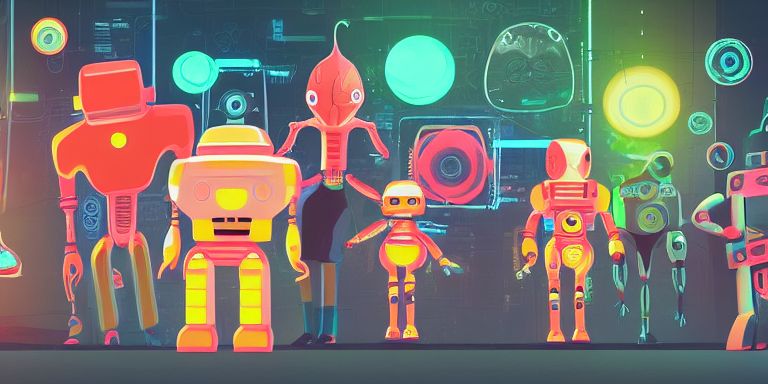5 Minutes with Stefan Bohacek, bot builder
If Stefan’s name sounds familiar, we profiled him 6 years ago (essentially, a million in web years) about creating Twitter Bots. Obviously a lot has changed since then (we got TikTok, a global pandemic happened, we lost Twitter) aside from Stefan's passion for creating bots. We caught up with him to chat about the recent AI hype and the future of bots on the web.
Glitch: Do you remember the first bot you ever interacted with?
Stefan: The first two bots I remember learning about would be @congressedits, which is a bot that posts anonymous Wikipedia edits made from IP addresses associated with the US Congress, and @YesYoureRacist, which originally retweeted tweets that contain “I'm not a racist.” Now it seems to be more of a manually managed account.
Either way, both of these showed me how a simple, yet clever idea can be very impactful.
I imagine that there are many folks these days who hear "bots" and (similar to the word "hacking") assume the worst: misinformation, threats to democracy, spam, etc. Does this happen when you talk about your work and if so how do you reconcile that in a way that shows how great bots can be without dismissing the threat that actual bad bots are?
I don’t actually recall having this conversation personally, but I am very much aware of this perception.
I have this video, from a few years ago, of a UX review of Botwiki done by someone who’s not too familiar with creative bots. And I really enjoy the part where the person speaking goes from visiting a website on which they have no idea what to expect, to saying: that’s kind of cool.
I hope Botwiki has the same impact on people who come across it, perhaps by accident, or trying to learn more about other kinds of bots, and realizing that there’s a lot more to this topic.
There’s been so much change and uncertainty in a lot of the bot-building world lately, what keeps you motivated to help people build bots even when it’s challenging?
I’ve been working on Botwiki for a few years now, and there were definitely moments when I did feel burnt out. And that’s when you know you need to step back from what you’re working on, take a break, focus on something else.
But this site, even if it’s a pretty small niche, feels very special to me. There really isn’t a project quite like this one, and I still get occasional emails, less so now, compared to the early days, with people reaching out with questions, asking for help with things not covered by my tutorials. And I really enjoy that, I like being able to help others, and seeing their excitement when they get their idea working. I find that very rewarding.
What's a platform you wish you could build a bot for but they don't have an API for it?
That’s a great question, and I guess I don’t really have an answer for you. It feels like every big platform has an API nowadays. And if not, there’s usually a way around it.
I would say, the one challenge I see here is platforms starting off being open to developers, but as their venture capital funding starts to dry up, and they need to turn profit, things start to get closed off and limited. See Twitter for example, where they’re now charging ridiculous sums for things that used to be free.
AI hype aside, what do you actually see as being the next big thing for bots, and the like?
After Twitter’s takeover by Elon Musk last year, after a brief period of living in denial about the whole thing, I’ve moved my attention to the fediverse. I’ve had an account on Mastodon for a few years by then, but didn’t really get much out of it, but that has changed significantly, as more and more people flee Twitter. And it’s a breath of fresh air, on many levels, including it being a great platform for creative automation.
Mastodon’s API is very similar to Twitter’s, with fewer restrictions, and it’s completely free, so it’s really easy to get up and running on it, even to move over your existing Twitter bots.
And that’s what I’ve been seeing, folks have been migrating their bots from Twitter, and making a lot of new ones as well.
And because of how the fediverse works, you can actually build a bot that doesn’t really run on any of the existing fediverse networks, like Mastodon, but it’s its own server, so to speak, and becomes a part of the fediverse. And that’s pretty cool from a technical point of view, and something you can’t do with today’s commercial social networks.
Do you have a favorite project, or maybe bot that you’ve seen on Glitch?
I have quite a few of them saved, the list is pretty long. I really like lists on Glitch, like this one with Data Journalism projects. I’m into music, so I definitely have to mention this nice little drum machine. I’m a big fan of the documentary filmmaker Adam Curtis, so this title card builder using his style was a neat find. The Online Museum of Multiplayer Art is also great. And I enjoy browsing the various demos, like the ones for A-Frame. And as for bots, I really like this sock-generating one, which is actually a remix of my Twitter bot template.
Where can we find you online?
I host my own Mastodon instance, and you can also follow me on SoundCloud and GitHub. And Glitch, of course!
Stefan Bohacek is a web developer and engineering manager, and a prolific bot creator. His templates for building bots have been remixed by hundreds of developers, and his work has been featured in Wired, The Verge, and other tech blogs and online publications.

